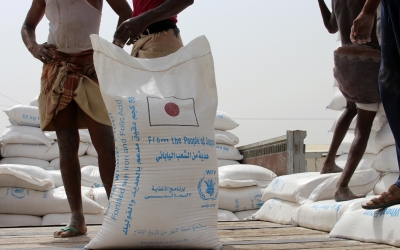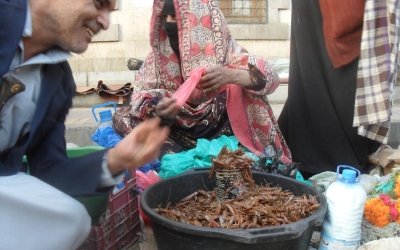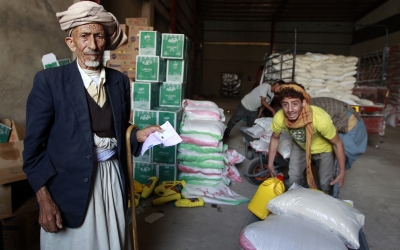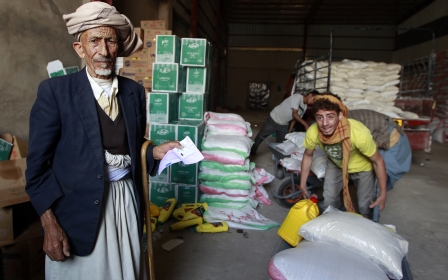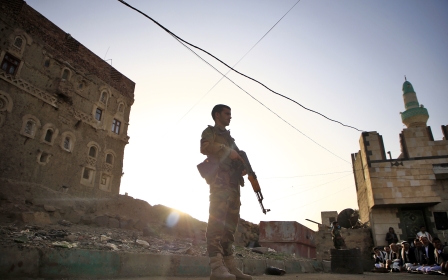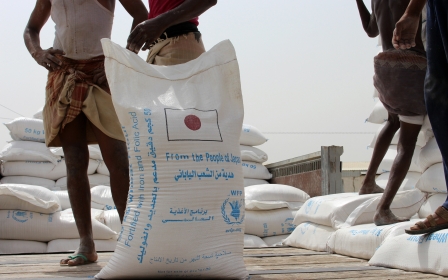EXCLUSIVE: UN agency suspends Yemen food aid in Sanaa amid disputes with Houthis
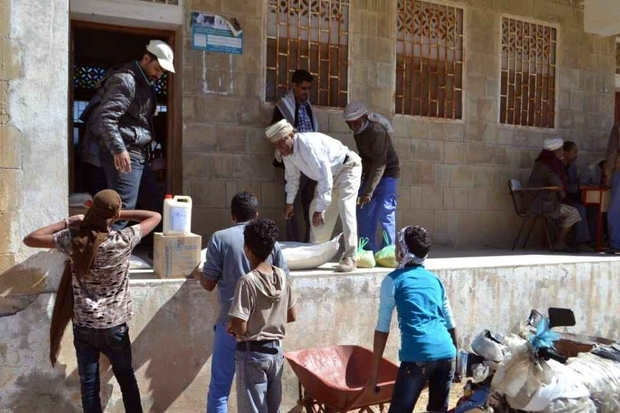
After several months of disputes between Yemen's Houthi rebels and the World Food Programme (WFP), sources have told Middle East Eye that the UN agency has suspended its food assistance in the capital Sanaa.
The WFP has said that the Houthis do not allow the agency to operate independently and that aid is being diverted for profit and, or, for other purposes, so many beneficiaries are not receiving food assistance.
The agency also said the Houthis had rejected the implementation of a biometric identification system to help the delivery of aid.
UN food chief David Beasley had warned on Monday that a phased-suspension of food assistance was likely to begin later this week over the issues.
Beasley, executive director of the WFP, called on the Houthis to “simply let us do our job”.
New MEE newsletter: Jerusalem Dispatch
Sign up to get the latest insights and analysis on Israel-Palestine, alongside Turkey Unpacked and other MEE newsletters
“If we do not receive these assurances then we will begin a phased suspension of food assistance, most likely towards the end of this week," he said.
"If and when we do initiate suspension, we will continue our nutrition programme for malnourished children, pregnant women and new mothers,” he told the UN Security Council.
Decision already taken
However, an employee at the WFP in Sanaa told MEE: “The decision of first phase-suspension was already taken and we did not provide distribution centres in the capital with any food for this month.
“The suspension is taking place gradually, and every month we will suspend distribution in one governorate until we reach [an] agreement with the Houthis or suspend food assistance in all the Houthi-controlled governorates.”
'The biometrics system has a political purpose more than humanitarian'
- Source, NAMCHA
The source, who wished to remain anonymous, said that management in Sanaa had warned employees to be cautious as there might be a reaction from the Houthis to the suspension, which he said was supposed to be announced to the public on Thursday.
He added: “The WFP will continue to work normally to help people in other governorates, and we hope that the Houthis allow INGOs (international non-governmental organisations) to work independently.”
MEE contacted some supervisors of food distribution centres in Sanaa and they confirmed that had not received any food this month from the WFP, adding that beneficiaries are worried about the news of the suspension.
Houthis slam suspension
On Monday, Beasley said the WFP had been unable to implement agreements with Houthis on the registration of people in need and the rollout of the biometric system - using iris scanning, fingerprints or facial recognition - to support aid delivery.
“We are now assisting feeding over 10 million people per month but as the head of the World Food Programme, I cannot assure you that all the assistance is going to those who need it most,” Beasley said.
“Why? Because we are not allowed to operate independently and because aid is being diverted for profit and / or other purposes.”
The Houthis held an emergency meeting on Monday morning to discuss the first phase-suspension of food assistance.
Abdulwahab Sharaf Addin, the deputy head of the Technical Committee for Humanitarian Relief, said: “The decision to suspend the food assistance by the WFP will aggravate the lives of thousands of needy people, IDPs and families affected by the war, especially amid the continuation of the aggression, siege and economic war [by the Saudi-led coalition],” according to the pro-Houthi Saba News Agency.
Saudi Arabia leads a Western-backed military coalition that intervened in Yemen in 2015 to restore the government of President Abd Rabbuh Mansour Hadi, who was kicked out of power in Sanaa by the Houthi rebels in 2014.
Sharaf Addin said that 285,000 families receive monthly assistance from the WFP in Sanaa, including 96,000 displaced families from different provinces.
He said that the assistance from the WFP in Sanaa used to target 65 percent of those in need of aid.
A statement following the meeting said: “The decision of the WFP does not belong to any humanitarian level and it is against customs and international standards.”
Threat to national security
The WFP is in dispute with the Sanaa-based public authority,NAMCHA, which controls the list of beneficiaries, but sees the implementation of the biometric system using iris scanning, fingerprints or facial recognition as a threat to national security.
'If I do not receive the food basket this month, my family will suffer to find food'
- Kahlan Al-Marani, father of six children
Earlier this month, Mohammed Ali al-Houthi, head of the Houthis' Supreme Revolutionary Committee, said the WFP's insistence on controlling the biometric data was in violation of Yemeni law.
“NAMCHA should control the list of beneficiaries as this is something relating to national security and we cannot provide any INGOs with such details,” a source in the NAMCHA told MEE.
The source, who wished to remain anonymous, said that the technical committee for Humanitarian Relief is discussing alternative solutions to the biometrics system as this procedure cannot be allowed.
The source claimed that the WFP had started to look for pretexts to suspend food assistance because the Houthis were preventing the agency from distributing expired food.
“On Monday, the authorities stopped dispatching a shipment of WFP expired food in Hodeidah, and authorities usually prevent the WFP from distributing expired food, so they are trying to look for pretexts to suspend their operations,” the source said.
“The biometrics system has a political purpose more than humanitarian, but we hope the technical vommittee can find a proper alternative so the WFP can continue to help needy people everywhere around the country.”
'Some families may starve to death'
The humanitarian crisis in Yemen remains the worst in the world.
Nearly four years of conflict and severe economic decline are driving the country to the brink of famine and exacerbating needs in all sectors.
An estimated 80 percent of the population – 24 million people – require some form of humanitarian or protection assistance, including 14.3 million who are in acute need.
As the situation deteriorates, the number of people in acute need is now 27 percent higher than last year.
Two-thirds of all districts in the country are already pre-famine, and one-third face a convergence of multiple acute vulnerabilities, according to the UN Office for the Coordination of Humanitarian Affairs (OCHA).
Kahlan al-Marani, a beneficiary of WFP food aid in the capital Sanaa and a father of six children, told MEE: “I used to receive a monthly food basket from the WFP by the end of each month, and today the food is running out from my house.
“If I do not receive the food basket this month, my family will struggle to find food and this may affect their health.”
Marani, 42, who earns less than 1,500 rials ($3) a day from his work as a motorcycle courier, said: “I depend on WFP food and cover other needs from my work’s income.”
He said that many of his neighbours receive food baskets from the WFP and they hope that the agency can overcome any disputes with authorities and provide them with food baskets.
“We do not know about disputes between authorities and the WFP and we cannot help to solve this problem, but we call on them both to reach an agreement for the sake of needy families," he said.
“Some families may starve to death if they do not receive the food from WFP.”
'Aid diversion may happen to some extent everywhere'
Zohair al-Ma’amari, an aid worker in Sanaa, told MEE: “We need the WFP to increase its operations in Yemen as there are many needy people [that] do not receive assistance, but I was shocked to hear the news of the suspension.”
Ma’amari has been working with the Education Ministry for its school feeding programme to distribute food assistance.
The ministry is a partner of the WFP in Sanaa and some other provinces.
“Aid diversion may happen to some extent everywhere, and not only in Yemen, but I do not believe that depriving needy people from food assistance is a solution for that,” he added.
Last month, MEE reported that the WFP's earlier warnings that it may have to suspend aid had caused panic among residents of Sanaa who were struggling to feed themselves.
"What I get from selling vegetables does not exceed 1,000 rials [$2] per day and this is hardly enough to pay rent," 49-year-old father-of-five Hani Alawi said at the time.
"I forced my children to sell ice cream in school to cover their needs, as I cannot pay for everything.
"I have been receiving monthly food baskets from WFP since early 2017 and we depend on that food," Alawi told MEE. "If not for that aid, we would die."
Middle East Eye delivers independent and unrivalled coverage and analysis of the Middle East, North Africa and beyond. To learn more about republishing this content and the associated fees, please fill out this form. More about MEE can be found here.


